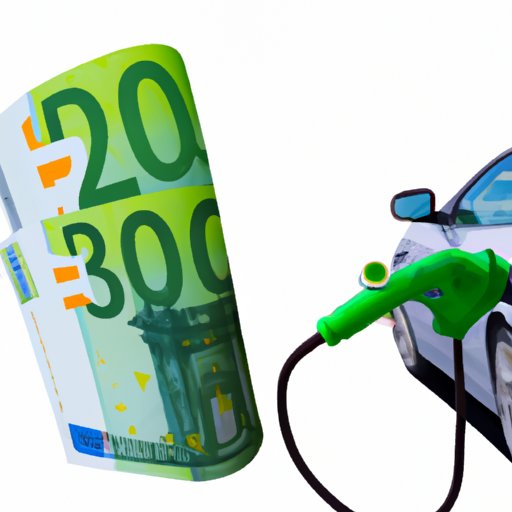Introduction
Electric cars are becoming an increasingly popular option for those looking to reduce their carbon footprint and save money on fuel costs. However, electric cars require a different type of fueling than traditional gasoline vehicles, and there can be some confusion as to how much it costs to charge electric cars. This article will explore the various costs associated with electric car charging, including installation costs, types of charging options, and government incentives.

Comparing the Cost of Charging Electric Cars to Gasoline Costs
When considering the cost of electric car charging, it is important to compare it to the cost of gasoline. The average cost of gasoline in the United States is currently around $2.60 per gallon, and the average fuel efficiency for a gasoline-powered vehicle is around 25 miles per gallon. This means that the average cost of fueling a gasoline-powered vehicle is roughly 10.4 cents per mile.
In comparison, the average cost of electricity in the United States is about 13 cents per kilowatt-hour (kWh). The average electric car gets around 4 miles per kWh, meaning the average cost of electric car charging is 3.25 cents per mile. This means that electric car charging can be significantly less expensive than gasoline, with a potential cost savings of up to 7 cents per mile.
However, there are some pros and cons to consider when comparing electric car charging to gasoline. For example, electric cars require a more complex charging system, which can add additional upfront costs. Additionally, electric cars typically have lower range than gasoline-powered vehicles, meaning they may need to be charged more often. However, electric cars also tend to be more reliable and require less maintenance than gasoline-powered vehicles, potentially resulting in long-term cost savings.

Outlining Average Electric Car Charging Station Prices and Installation Costs
When it comes to electric car charging, the cost of installation is one of the most important factors to consider. The exact price of installation will depend on the type of station and the complexity of the setup, but there are some general prices to keep in mind. Generally speaking, the cost of a basic Level 1 charging station can range from $200-$500, while a Level 2 station can cost between $500-$1,000. DC fast chargers can be significantly more expensive, ranging from $2,000-$20,000.
In addition to the cost of the charging station itself, there will also be installation costs to consider. These costs can include labor costs, materials such as wiring and conduit, permits, and any other necessary components. Generally speaking, installation costs can range from $500-$2,000 for a basic Level 1 station and up to $5,000 for a Level 2 or DC fast charger.
Exploring Different Types of Electric Car Charging Options and Their Associated Costs
In addition to installation costs, it is also important to consider the type of charging option you choose. There are three common types of electric car charging available: Level 1, Level 2, and DC fast charging. Each type of charging has its own advantages and disadvantages, and the cost of each type varies.
Level 1 charging is the most basic and least expensive option, using a standard 120-volt outlet. Level 1 charging is slow, taking 8-12 hours to fully charge a car, but it is the most convenient option and can be done at home. The cost of Level 1 charging is approximately 3 cents per mile.
Level 2 charging requires a special 240-volt outlet and is significantly faster than Level 1 charging. Level 2 charging usually takes 4-6 hours to charge a car and is often used in public places such as parking garages and shopping centers. The cost of Level 2 charging is approximately 6 cents per mile.
DC fast charging is the fastest option and is typically used for long-distance travel. DC fast charging can fully charge a car in 30 minutes or less, but it requires special equipment and can be expensive. The cost of DC fast charging is approximately 15-30 cents per mile.
Examining Government Incentives, Rebates, and Tax Credits for Electric Car Charging
In addition to the cost of the charging station and installation, there may also be government incentives available to help offset the cost. At the federal level, there are several tax credits and rebates available for electric car charging, including the Alternative Fuel Vehicle Refueling Property Credit and the Plug-in Electric Drive Motor Vehicle Credit. Additionally, many states and local governments offer their own incentives, such as cash rebates, grants, and tax credits.

Analyzing the Cost Savings of Electric vs. Gasoline Cars Over Time
Finally, it is important to consider the cost savings of electric cars over time. While electric cars tend to be more expensive up front, the cost of ownership can be significantly lower over the life of the car. Electric cars tend to be much more fuel efficient than gasoline-powered vehicles, resulting in significant savings on fuel costs. Additionally, electric cars require less maintenance than gasoline-powered cars, resulting in long-term cost savings.
Conclusion
Electric car charging costs can vary depending on the type of charger and installation costs. On average, electric car charging is significantly less expensive than gasoline, with a potential cost savings of up to 7 cents per mile. Additionally, there are various government incentives and rebates available to help offset the cost of installing a charging station. Finally, electric cars tend to be more fuel efficient and require less maintenance than gasoline-powered vehicles, resulting in long-term cost savings. With careful consideration of all these factors, electric car charging can be a cost-effective option for those looking to reduce their carbon footprint and save money on fuel costs.


